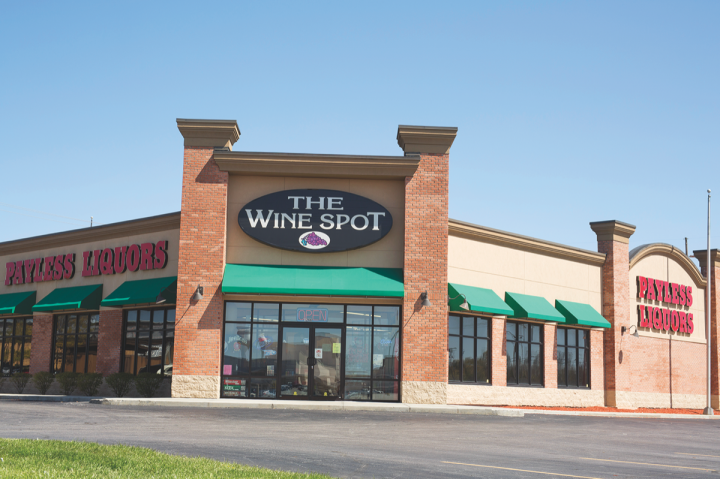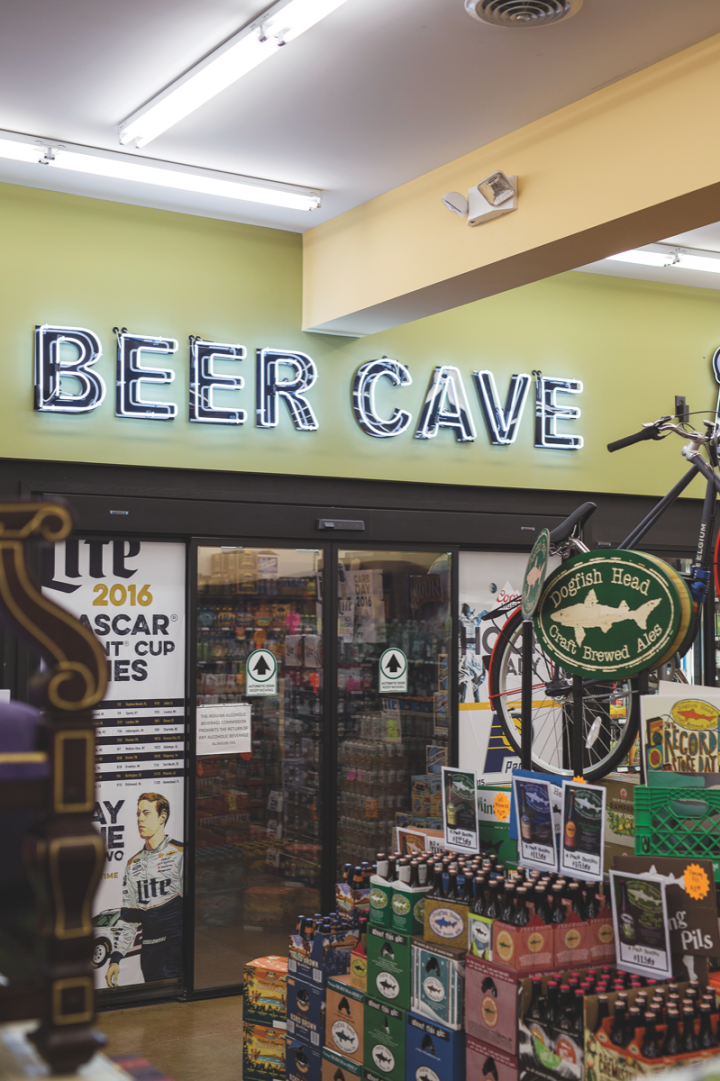
Forty-three years ago, Charlie Key set out on a new business venture—one that his wife, Linda Key, still jokingly calls his hobby. That hobby has paid off handsomely: Their company, Payless Liquors, has become one of the largest beverage alcohol chains in Indianapolis while still retaining its family charm.
With 25 stores in Indianapolis and surrounding towns, including Plainfield, Zionsville, Carmel, Greenwood, Fishers and Beech Grove, Indiana, Payless Liquors has thrived while adapting to the various challenges that Indiana’s package store industry has faced over the decades. “Our business has grown substantially every year,” Charlie says. “Last year, sales were up 15 percent.”
Payless Liquors’ annual revenue totals more than $40 million. The stores range in size from 4,000 to 12,000 square feet. Spirits comprise about 42 percent of sales, followed by beer at 39 percent, wine at 12 percent and miscellaneous items at 7 percent. The chain’s spirits sales soared by double digits last year, while wine was up around 8 percent and beer grew by roughly 4 percent.
Charlie launched Payless Liquors in 1973 with business partners Ron and Edith Beck and eventually bought them out. By the early 1980s, the Keys owned four outlets in Indianapolis. They opened a new store every year for much of that decade. The expansion pace slowed in the 1990s, but by 2000, the Keys again began adding new locations, just as outlying Indianapolis communities were developing. Payless Liquors’ growth has continued unabated since then.
“We’ve been here for over 40 years, and it’s still a family business,” says Liz Key, who joined her parents’ company full-time in 2008. Liz notes that her aunts Brenda Daum and Jackie Sears oversee stores as district managers. She also cites the contributions of employees like James Ulander, another district manager. “We have many staff members who aren’t family, but we consider them family,” Liz says. “If it weren’t for some of them, we wouldn’t be in business today.”

Crowded Marketplace
Indiana beverage alcohol retailing is a tough business. In the Indianapolis market alone, Payless Liquors competes with such multiunit operators as Big Red Liquors, 21st Amendment and Crown Liquors. However, Charlie points to large grocery chains like Kroger as his primary competition due to their buying clout and growing interest in beverage alcohol. He’s grateful that liquor stores are the only off-premise operators permitted to sell cold beer in Indiana, despite continued efforts by grocery and convenience store operators to revise the regulations.
Charlie explains that the ability of Indiana package stores to stock inventory in warehouses has also helped independents compete against much larger operators. “Warehousing makes it easier to buy at the right price,” he says, noting that Payless Liquors operates two warehouses with more than 30,000 square feet of total storage space. The facilities allow the chain to stock nearly every type of spirits, wine and beer brand available. “Not long ago, a 4,000-square-foot store was considered a pretty good size,” Charlie says. “Now, we’re building 11,000- to 12,000-square-foot stores.”
The company’s newer venues feature temperature-controlled wine rooms, tasting bars, meeting spaces, wine-sampling machines, beer caves and 20 to 30 cooler doors. “Our new stores are unequaled in the Midwest,” Charlie says. “We’re known for having huge variety. If a customer wants something, they’ll find it at Payless.”

Booming Bourbon
Payless Liquors offers more than 7,500 spirits SKUs, and top-selling brands include Jim Beam Bourbon ($24.99 a 1.75-liter bottle), Smirnoff vodka ($16.99) and Kamchatka vodka ($7.99). Bourbon is the chain’s hottest spirits category. “We pride ourselves on having one of the best Bourbon selections in the state,” says Liz, who oversees the spirits category. The company has offered private barrels of Maker’s Mark, Blanton’s and Eagle Rare, as well as Mount Gay Black Barrel rum and Herradura Double Barrel Reposado Tequila. Like other retailers, Payless Liquors is dealing with high demand for small-batch and allocated Bourbons. In response, Liz created the “Closet Collection” on the company’s website which allows customers to reserve bottles of Bourbon, as well as Cognac, Tequila, Scotch, and Irish and Japanese whiskies.

Payless Liquors stocks more than 700 beer SKUs. Sales of craft beer jumped about 8 percent at the chain last year, driven partly by Indiana’s Sun King and 3 Floyds brands. Mainstream domestic brews increased 2 percent, led by Bud Light, Miller Lite and Coors Light. “Even the budget beer category is strong,” Charlie notes. Beer singles are big business in Indiana liquor stores because of the cold beer laws, and Payless Liquors does brisk sales in craft singles, which are generally priced at $4 to $5 for two bottles or cans.
In the wine department, Payless Liquors offers nearly 12,000 SKUs. Aggressive pricing on Beringer White Zinfandel and offerings in the Kendall-Jackson Vintner’s Reserve line ($9.99) has led to strong volume for both brands. Fetzer Vineyards’ 1000 Stories Zinfandel ($15), finished in Bourbon barrels, has found an enthusiastic following among the chain’s Bourbon fans. Overall, Charlie says wines from California and Washington perform best, while sales of Prosecco also have been strong.
Miscellaneous merchandise also does well at Payless Liquors. Liz points to craft beer buckets ($30 or less) and gift-wrapped flasks packaged with 100-ml. bottles of Fireball ($5 or less) as popular choices. “We’ve found success not with high-end gift baskets, but with lower price points and impulse buys,” she says.

Eye On The Customer
Much of Payless Liquors’ success is rooted in customer service, whether that means greeting patrons with a smile or educating them about products. “We have a lot of customers who prefer to come to our stores because we take care of them,” says Linda, who has worked in every role at the company over the years, including overseeing the finances.
Liz manages in-store tastings, events and other marketing programs. Staff members and distributors lead frequent wine, beer and spirits sampling opportunities. Larger-scale events include twice-annual Bourbon tastings and charitable fundraisers. The company’s Payless Has Heart event, held in association with Jackson Family Wines earlier this year, raised money for the American Heart Association.
Payless Liquors is a longtime advertiser in local newspapers, but has recently been transitioning its ad dollars to other channels. Since last August, for example, Payless has sponsored the local radio sports show “Grady and Big Joe.” The company redesigned its website, Payless-liquors.com, last year, and social media—including Facebook, Twitter and Instagram—has become a bigger focus. Email blasts are sent out to about 12,000 customers twice a month on average.

Continued Growth
Charlie expresses concern over the challenges facing independent beverage alcohol retailers in the Hoosier State, including greater competition from grocery, convenience and big box chains, as well as the threat that Indiana’s Sunday sales ban could be lifted. Yet he still sees opportunity ahead and is proud of what his family has accomplished. “We’ve developed some of the most beautiful stores in the Midwest,” Charlie says.
Indeed, Payless Liquors doesn’t appear to be finished with expansion. The company’s 26th store will open next year in the northwest Indianapolis suburb of Whitestown, Indiana. But don’t expect Payless to stray from its roots as a family- and community-oriented business. “We’re going to remain a chain that’s the right size to manage and one where employees will always know their customers well,” Liz vows.